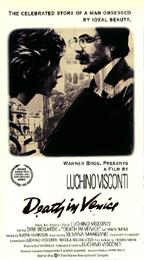|
Reviews of Recent Independent, Foreign, & Documentary Films in Theaters and DVD/Home Video
DEATH IN VENICE
Loosely adapted from Mann's novella,
Death in Venice is worth seeing for its stunning cinematography alone. Gustav Aschenbach (an
outstanding performance by Bogarde) is an accomplished composer
struggling to finish his final great work. He takes a trip to Venice to find inspiration. However,
inspiration takes the form of an adolescent boy named Tadzio (Andresen), and the composer is
all but lost in his obsession with the young beauty. The decision to change Aschenbach from a
writer to a composer in the adaptation is an important one; it makes Aschenbach's goals and
eventual decline much more tangible, and thus easier to be portrayed on screen. Director Visconti has
masterfully recreated the time period, the early 1900s, and woven the music of Gustav Mahler into the film to
provide a stunning and slowly-paced adaptation, yet there are some obvious difficulties in adapting such an internal
book to the screen. Some metaphors (primarily that of Aschenbach's lust for youth) are forced to
become real, and the film makes this physical desire much more concrete. Nonetheless, there are
some advantages to using film, such as the awareness of Aschenbach's increasing vanity,
allowing for his disgust with an old man feigning youth at the beginning of the film to be much
more poignant.
DVD Extras: Highlighting Visconti's meticulous filmmaking, the featurette is a must-see for an understanding of the scrupulous work
that went into this film. And it is here that Visconti explains his choice for making Aschenbach a composer and the significance both
Aschenbach and Mann had with Mahler. Lisette Johnson
|
